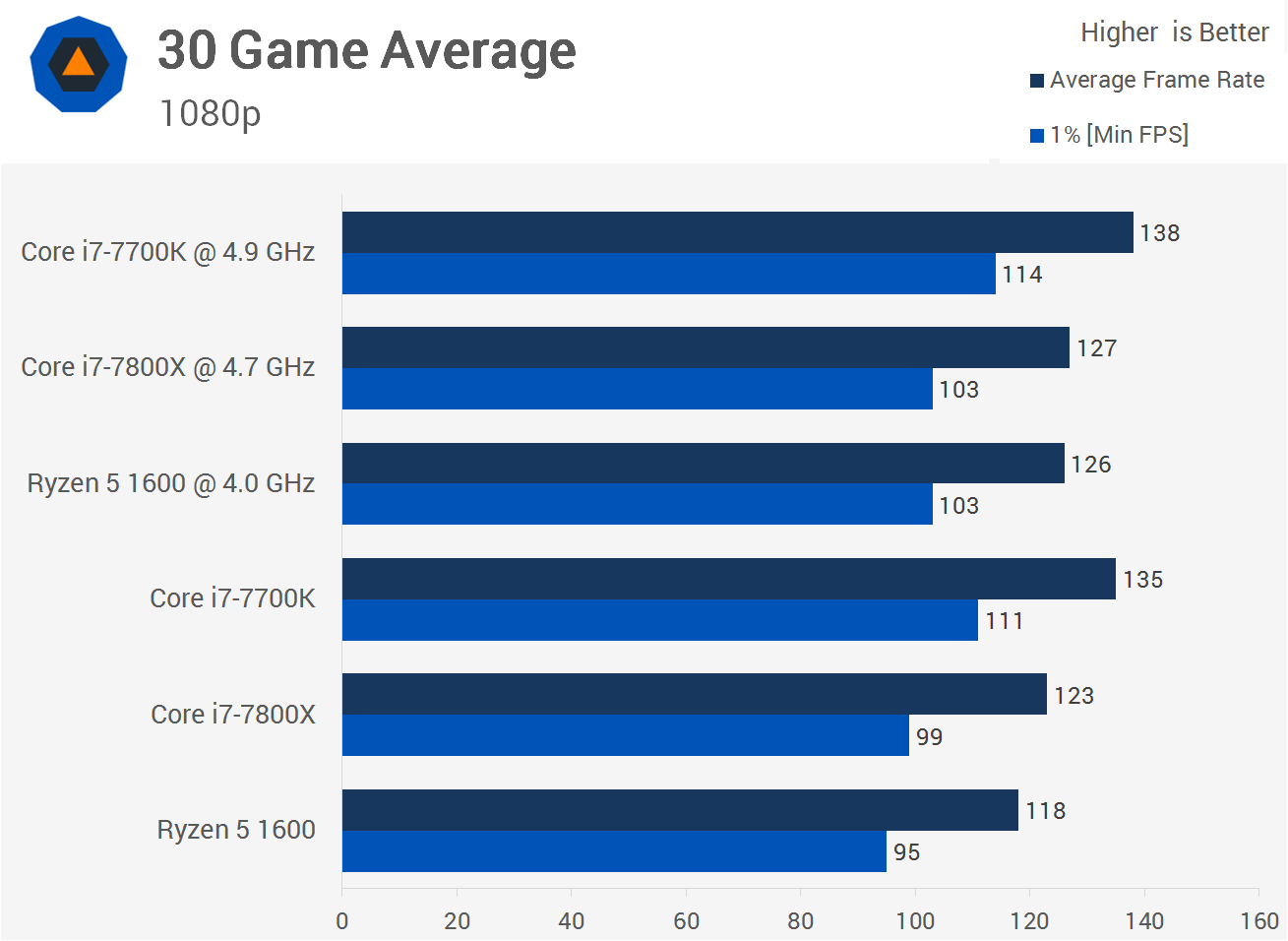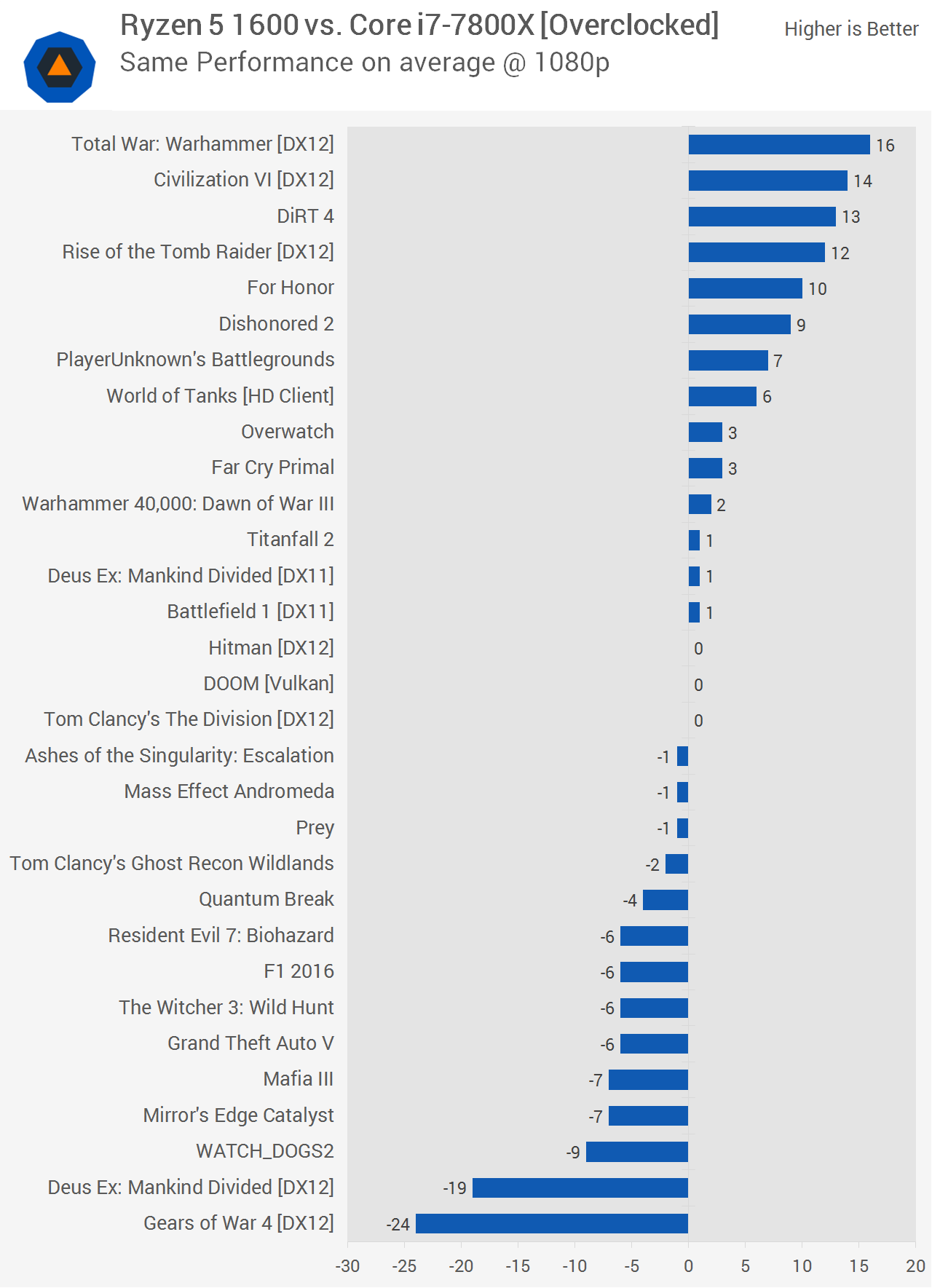Power Consumption & The Verdict

I have to admit, this just seems wrong. I still can't get used to seeing AMD CPUs consuming less power than their Intel counterpart. It feels unnatural. Those power-hungry FX chips sat atop our power charts for so long and I'm glad we can finally move on from them.
For what seemed like a similar level of performance (we'll get to that in a moment), the R5 1600 consumed quite a lot less power compared to the 7800X. With both chips overclocked, the Ryzen system consumed 15% less power and 18% less before we did any overclocking – a definitive win for AMD. Who predicted this at the beginning of the year? I'll admit it certainly wasn't me.
We tried to get to the point quickly on this one but there's no easy way to do that when benchmarking 30 PC games. Overall, we're impressed with the performance displayed by the Ryzen 5 1600. Granted, it was a good chip from day one but it seems like the few months of optimizations have made it even better.
Before we get to our great graph of averages, it's worth noting that after spending an extra two days confirming these results (mostly re-testing and comparing the Core i7-7700K and Ryzen 5 1600), we can say that while these chips are strangely close in performance, our figures are accurate.
Out of the box the R5 1600 is 13% slower than the more expensive 7700K. Keep in mind, there were a few GPU-limited games and even worse, a few that were frame-capped, they weren't limited to 60fps. Many had 120fps+ limits, so the Ryzen CPU was still pushing the GTX 1080 Ti hard.

Once overclocked, the $215 R5 1600 was just 9% slower than the 7700K, while it matched the $415 7800X. I'm sure you're itching to see what the overall picture looks like so we won't wait any longer.
Just looking at the 7800X and R5 1600, here are the overclocked results when comparing the minimum frame rates. As we just saw, both averaged a minimum of 103fps across the 30 games tested. We can clearly see where the R5 1600 enjoyed some wins and suffered through a few loses.

Some readers will undoubtedly declare that I'm biased towards a certain company, but if that was the case, there's no way you would see Deus Ex: Mankind Divided and Gears of War 4 in this list. Meanwhile, if I were biased towards Intel, I'd drop Total War: Warhammer and Civilization IV.
It's worth noting that the number of titles won and lost are equal, and even if we were to remove some of the worst performing games for either platform, it would only skew the results slightly toward either camp, which is the beauty of testing with such a massive sample of games.
For example, if we remove AMD's worst performing title, Gears of War 4, the R5 1600 would become just 1% faster than the 7800X. Remove AMD's second worst title, Deus Ex Mankind Divided using DX12, and the R5 1600 is still just 1% faster on average.
Please note that because there was a large difference in performance between running Deus Ex: Mankind Divided with DX11 and DX12 with the Ryzen CPU, I included both the results in this graph. However, I only included DX12 results for Total War: Warhammer and not the DX11 results since the R5 1600 was much faster in both tests. I favored DX12 as it's the newer API.
If you care at all about value, the Ryzen 5 1600 is clearly the way to go. This is why we recently named it the best value performance desktop CPU. It was unlikely that the Core i7-7800X was going to change that, but we hoped the performance would at least be a compelling reason to buy Intel's new six-core processor.
Ryzen will hit 4GHz with the box cooler but it will be a more mild experience with a $20 aftermarket cooler like the Cooler Master 212, so keep that in mind. The 7800X on the other hand cannot be overclocked to 4.7GHz using a 240mm AIO closed loop solution. Instead, it required a $380 custom loop setup to achieve that result.
Shopping shortcuts:
- AMD Ryzen 5 1600 on Amazon
- AMD Ryzen 5 1600 on Newegg
- Intel Core i7-7700K on Amazon
- Intel Core i7-7700K on Newegg
- Intel Core i7-7800X on Amazon
- Intel Core i7-7800X on Newegg
Compared to the 7800X, the R5 1600 deliveres a similar experience once overclocked and even at stock it was just 4% slower throughout our benchmarks. It also consumes less power, costs considerably less, and comes with a better cooler out of the box. The Ryzen 5 1600 is the obvious choice for gamers.
